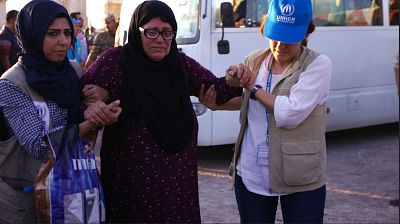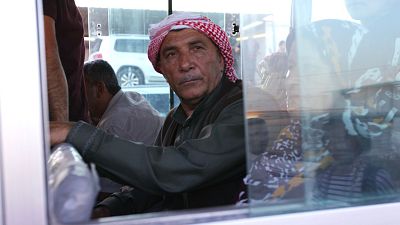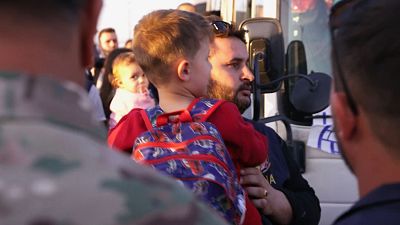NBC News went a refugee camp where hundreds of Kurds are sheltering from Turkey's offensive.
BARDARASH REFUGEE CAMP, Iraq — Many of the hundreds of thousands of mostly Syrian Kurdish refugees rushing to escape the Turkish-led incursion into northeastern Syria are carrying all they could grab as well as a sense of outrage at the American troops they say abandoned them.
"America has betrayed the Kurds," said Rania, 20, from Qamishli, a city along the Turkish border that took heavy Turkish artillery shelling during the early days of the incursion last week. "We worked hand in hand, but no longer. Now there is no future for Syria."
Rania was among more than 800 mostly Kurdish Syrians who arrived at Bardarash camp in northern Iraq on Wednesday, fleeing fresh fighting whose ferocity caught civilians, aid agencies, Kurdish fighters and even many U.S. soldiers by surprise.
The massive military operation followed President Donald Trump's abruptdecision to withdraw American troops from the border region between Syria and Turkey, allowing the Turkish military and its Arab proxies to fight Kurdish armies and displace civilians.
"America has left us and all these things happened," said Omar Boby Ossy, an elderly man who traveled for four days with his family from the northern Syrian city of Ras al Ain.
Ossy said he spent several days on the border negotiating his crossing with smugglers. Border officials from the Syrian Democratic Forces, made up primarily of Kurdish fighters, have not allowed civilian refugees to cross without the proper paperwork so most make the journey illegally.
"When we arrived at the border with Kurdistan we were allowed to cross," Ossy said. "We paid money. Five hundred dollars, four hundred dollars for each person."
The alternative, he said, was to face "tanks, missiles, mortars, jets flying above" in his hometown — a Kurdish city that had remained remarkably peaceful throughout Syria's eight-year civil war until just this week.
Trump's decision to pull U.S. troops pushed the SDF to make hasty new alliances, including with the Syrian regime of Bashar al-Assad and his Russian backers.
It's also forced international aid agencies — long accustomed to handling the unpredictable shifts in Syria's nearly decadelong war — to scramble. Doctors Without Borders and the International Rescue Committee both announced this week that they had suspended their services in northeastern Syria out of fears for their staff. Other organizations evacuated workers and scaled down their efforts.
This has forced aid agencies in neighboring Iraq to be nimble. The Bardarash camp sat empty for more than a year, but it has sprung to life in the last week.
The camp's history is part of the echoes of Syria's humanitarian tragedy that continue to reverberate across the Middle East. It recently hosted thousands of internally displaced people belonging to the Shabak ethnic group who had fled ISIS in Iraq's Ninevah Valley. After ISIS was defeated in Iraq in 2017, the Shabak were eventually made to return home.
The camp is filled with semipermanent huts and latrines with cracked walls and broken windows. Those will soon be repaired, said Rasheed Hussein Rasheed, a senior communications public information associate for the United Nations High Commissioner for Refugees (UNHCR). But in the meantime the incoming refugees will live in tents hastily erected on concrete floors, he said.
"As you can see the tents have not been pitched according to our standards. But this is ready now at least to not let the arrivals to stay in the open," he said, gesturing to rows of white tents emblazoned with the blue UNHCR logo.
"It's very sunny. It could be very hot later on. It could be stormy later on," Rasheed said. "But our best thing, our main thing here, is to ensure that people are staying in their shelters."
UNHCR and other aid agencies will have to work fast. The more than 800 arrivals Wednesday are among 1,035 refugees who have arrived in Iraq since the start of the latest round of fighting last week. Another 622 arrived Thursday.
The journey from northern Syria to northern Iraq is only a few hundred miles as the crow flies. But it's a horrifying and costly ordeal for civilians who cannot predict shifting alliances and rapid troop maneuvers. Many arrived looking exhausted and frightened, shocked by the dozens of reporters who greeted their 12 buses after a more than three-hour journey from the border.
Rasheed from UNHCR said his organization, along with a patchwork of other local and international nongovernmental organizations like the World Food Programme and the Kurdish-run Barzani Foundation, would manage the camp. But they are in desperate need of donations.
The new round of fighting in northeastern Syria has added to a nearly unmanageable worldwide migration crisis: The global population of displaced people reached a record high 70.8 million at the end of 2018, according to official UNHCR statistics.
"I've been here since 2012 and I know that people are here and many people are still in the camps. They want to get back. Nobody wants to stay in the camps," said Rasheed, who stressed that conflict resolution remains the only method of assuaging displacement crises. "They want to have a better future for their kids. They want to have a better future for their lives as a nation."














